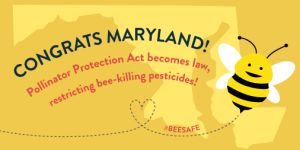27
May
Maryland Pollinator Protection Act Becomes Law
(Beyond Pesticides, May 27, 2016) — Thanks to the hard work and efforts of beekeepers, environmental groups, scientists, legislators and activists, Maryland is the first state to pass legislation through its General Assembly that restricts consumers from using neonicotinoids, a pollinator-toxic pesticide. Earlier this month, the state of Connecticut also passed far-reaching legislation aimed at protecting pollinator populations from these toxic chemicals.
 The Maryland Pollinator Protection Act (Senate Bill 198/House Bill 211) will become law without the Governor’s signature. Supporters had feared a veto from the executive office, but as a result of overwhelming pressure from beekeepers and activists, Governor Larry Hogan (R) allowed the bill to come into law. Under the Act, consumers will not be permitted to buy pesticides that contain neonicotinoids starting in 2018. Certified pesticide applicators, farmers and veterinarians will be still be allowed to use neonicotinoids.
The Maryland Pollinator Protection Act (Senate Bill 198/House Bill 211) will become law without the Governor’s signature. Supporters had feared a veto from the executive office, but as a result of overwhelming pressure from beekeepers and activists, Governor Larry Hogan (R) allowed the bill to come into law. Under the Act, consumers will not be permitted to buy pesticides that contain neonicotinoids starting in 2018. Certified pesticide applicators, farmers and veterinarians will be still be allowed to use neonicotinoids.
Connecticut’s bill also restricts consumer use of neonicotinoids. In addition, it requires the creation of pollinator habitat on state lands, and begins to address the use of these chemicals in agriculture by developing best practices on neonicotinoid coated seeds, and model pollinator habitat in farm preservation programs.
As Maryland’s bill made its way through the legislature, an amendment was attached to the Senate language, and later rejected, that implied legislative intent to preempt (take away) the authority of municipalities in Maryland to adopt local pesticide restrictions that are more restrictive than state policy on all property within their jurisdiction. The Senate language, which required a report and recommendation “to ensure state laws and regulations are consistent” with EPA, would have put the legislature on record, for the first time, as seeking to ensure preemption. Maryland is one of seven states that does not preempt local jurisdictions from adopting pesticide restrictions more stringent than the state.
Numerous studies confirm that neonics contribute to bee mortality, as well as to declines in native pollinators, including birds and butterflies. At the national level, beekeepers lost an average of 44% of their colonies over the past year. Losses for Maryland beekeepers have consistently been higher than national averages, with beekeepers losing upwards of 60% of their hives in 2015.
“This is a historic moment for our state that can be attributed to the hard work and dedication of many Maryland scientists, beekeepers, farmers, legislators as well as public health, food and environmental advocates,” says Ruth Berlin, executive director of the Maryland Pesticide Education Network. “We are excited that this important legislation will become law. This Act is necessary for our future food supply. We hope this motivates other states — and the federal government — to reduce the use of toxic neonic pesticides.”
“If we’re going to have a healthy food system in this country, we need pollinators to thrive,” said Jay Feldman, executive director of Beyond Pesticides. “With the passage of the Pollinator Protection Act in Maryland, the Pollinator Health bill in Connecticut, states are sending a message to the White House, EPA, and Congress that the actions they’ve taken to date are simply not enough.”
For more information on the Maryland Pollinator Protection Act, see this fact sheet, or previous Beyond Pesticides’ Daily News stories. More information on the pollinator crisis can be found on the Bee Protective webpage.
All unattributed positions and opinions in this piece are those of Beyond Pesticides.










